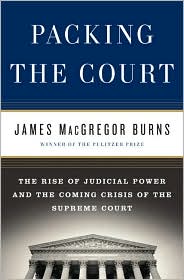 m Liptak in the New York Times.
m Liptak in the New York Times.One is that the court has for more than 200 years illegitimately claimed a power not granted to it by the Constitution. The other is that it has on the whole used this power to protect the powerful and to thwart progress....
[T]he book’s title is, of course, a reference to Roosevelt’s failed attempt to increase the number of justices after the court repeatedly struck down New Deal legislation. That episode, presented in lively detail, accounts for only two of the book’s 12 chapters, but it informs Burns’s view of the court from start to finish.
Liptak finds Burns' attack on judicial review "hard to take very seriously as a practical matter this late in the life of the Republic." Continue reading here.
Burns' book ends with a challenge, writes Emily Bazelon in Slate.
Burns imagines a president—he hopes this president—leading Congress to pass progressive legislation that amounts to a new New Deal. If a "hostile" Supreme Court then struck down such a compact, the president, Burns proposes, should refuse to obey the court. The president "would flatly announce that he or she would not accept the Supreme Court's verdicts because the power of judicial emasculation of legislation was not—and never has been—in the Constitution."...
[A]smackdown between Obama and the Supreme Court is nowhere on the horizon. But it's a tribute to Burns' lucid history of the Supreme Court that by the time you reach his audacious proposal, tucked into the conclusion, you're ready to entertain it seriously for a moment—and to think about its merits for longer.
Ultimately, Bazelon is skeptical: "Would we really be better off placing more faith in Congress or a shades-of-Cheney strong executive?" The rest is here.
Also in the NY Times, Jonathan Tepperman reviews A SAFE HAVEN: Harry S. Truman and the Founding of Israel by Allis Radosh and Ronald Radosh.
THE THIRD REICH IN THE IVORY TOWER: Complicity and Conflict on American Campuses by Stephen H. Norwood is taken up by Glenn C. Altschuler in the Boston Globe.